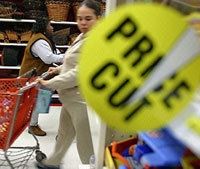|
 |
| Shoppers in the US.
Sluggish job growth month made Americans more cautious over the past
month, sending a key measure consumer confidence tumbling, a survey by the Conference Board
showed. (AFP) |
A sharp drop in US consumer confidence in a survey marked another sign
of a cooling trend in the world's largest economy, with a key labor market
indicator due later this week.
The Conference Board consumer confidence index skidded more than seven
points to 98.2 in August, down from a revised 105.3 in July, the private
research group said, citing increased caution about the outlook for jobs.
"The slowdown in job growth has curbed consumers' confidence,"
Conference Board consumer research chief Lynn Franco said in a statement.
"The level of consumer optimism has fallen off and caution has
returned. Until the job market and the pace of hiring picks up, this
cautious attitude will prevail."
The index was the latest in a series of disappointing economic reports
that could suggest a slowdown in the US economy.
"July's poor employment report has consumers nervous about the
recovery's strength," said Sung Won Sohn, chief economist at Wells Fargo.
"Campaign advertisements portraying an economy on shaky ground are also
having their effect on confidence."
Another report out Tuesday, the Chicago purchasing managers' index,
sank to 57.3 percent in August from 64.7 percent in July. Any number over
50 indicates growth, so the report is consistent with a slower growth
trend.
Economists see consumer confidence as a crucial indicator because it
often impacts consumer spending, which accounts for two-thirds of US
economic activity.
"Confidence fell, and it should not have surprised anyone," said Joel
Naroff at Naroff Economic Advisors.
"With gasoline prices sky high, the job situation not great, Iraq
always in the news and the incessant political ads depressing everyone, it
would have been amazing if the confidence measures rose."
But Naroff said the report does not mean the economy is lagging.
"Even when the indices were low, people still spent, so I don't think
the Fed or investors should get too worked up about this number just yet,"
the economist added. "A few more months of large declines and yes, it
might be time to panic."
Moody's Investors Service chief US economist John Lonski said consumer
confidence "was perhaps skewed lower by the steep run-up in crude oil
prices," suggesting confidence may rebound in September.
"Nevertheless, the drop in consumer confidence brings attention to a
still-slack labor market, to a perceived shortage of attractive job
opportunities."
Some economists and Federal Reserve Chairman Alan Greenspan argue
that the economic "soft patch" is temporary and that stronger growth is
returning, justifying the move toward gradually higher interest rates.
Evidence of that will be apparent in Friday's August employment report,
which comes after two months of disappointing job growth.
(Agencies) | 